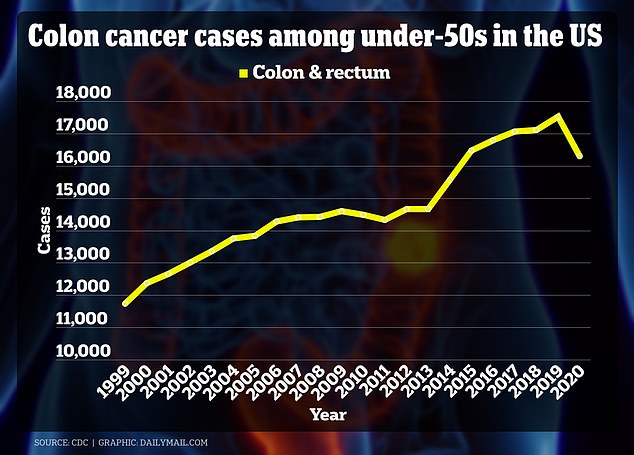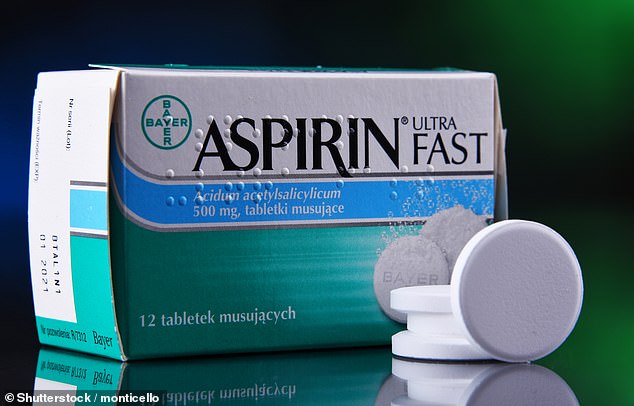People who take aspirin every day may have a lower risk of developing colon cancer, a study suggests.
The common painkiller appears to overload immune cells in the digestive tract, helping to prevent tumor cells from multiplying and spreading.
Other studies have linked aspirin use with up to a 40 percent lower risk of colon cancer.
But researchers do not recommend using the over-the-counter medication as a preventative because it can cause stomach ulcers, internal bleeding and even strokes.
The over-the-counter medication is usually used to reduce inflammation and make the blood thinner, reducing the risk of having a heart attack or stroke (file image)

The graph above shows colon cancer cases among people under 50 years of age by year. There is a drop in 2020 because the Covid pandemic caused fewer people to show up for screening.
Dr. Mona Rezapour, a gastroenterologist at UCLA, said in response to previous research: “We know that aspirin reduces the risk of colon cancer.
“But we still don’t recommend it to the general population because the benefits don’t outweigh the risks for everyone.”
For the study, researchers analyzed tissue samples from 238 colon cancer patients who were diagnosed with the disease between 2015 and 2019.
Of those, 12 percent (or 29 people) were found to be long-term aspirin users.
A comparison of the two groups showed that those who took aspirin daily had higher levels of CD80, a protein linked to greater immune cell activity.
They were also found to have fewer cancer cells around the lymph nodes (small bean-shaped structures that are part of the body’s immune system) and more immune cells circulating within the tumors.
The researchers said in the article: “These observations suggest a [immune-enhancing] effect of aspirin on [colon].
‘This is through the activation of [immune cell] “crosstalk” or added communication between cells.
The study is not the first to suggest that aspirin can prevent colon cancer, and other papers suggest that it reduces the risk by up to 40 percent by reducing inflammation.
Officials with the U.S. Preventive Services Task Force (who are behind the treatment recommendations) have also examined aspirin for its cancer-preventive effects.
But they have warned against regular use of the drug in the general population, saying the benefits do not outweigh the risk.
They noted side effects including kidney damage, internal bleeding and irritation of the stomach lining that causes ulcers.
About 40 million Americans take aspirin every day, usually to protect against stroke or heart disease.
It comes amid a mysterious rise in colon cancer cases among adults under 50, surprising celebrities like Chadwick Boseman, who played King T’Challa in Black Panther.
Nearly 18,000 cases are now diagnosed each year in this age group, compared to 12,000 per year before 2000.
An even greater increase has been observed among all cancers affecting the digestive tract.
Early-onset cancers of all forms are also on the rise, increasing 79 percent between 1990 and 2019 globally, according to an analysis published in BMJ Oncology last year.
Scientists are stumped as to what caused the rise, blaming everything from antibiotics to obesity and even a type of fungus.
A $25 million global investigation has also been launched to try to locate the causes.


